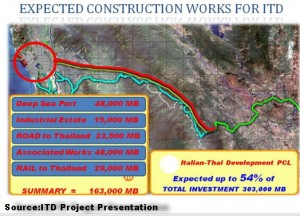The regions biggest development investment will threaten local livelihoods, cause environmental risks, and could displace thousands of locals, according to a Thai non-government organisation.
 A Thai based environmental advocacy organisation, The Foundation for Ecological Recovery (FER), has raised concerns regarding the Italian-Thai Development Public Company’s construction of a large deep seaport and industrial complex at Dawei, in southern Burma and close to the Thai border.
A Thai based environmental advocacy organisation, The Foundation for Ecological Recovery (FER), has raised concerns regarding the Italian-Thai Development Public Company’s construction of a large deep seaport and industrial complex at Dawei, in southern Burma and close to the Thai border.
The Dawei deep sea port and industrial estate will cover an area of approximately 205 square kilometres, or around 50,675 acres, up to 10 times larger than comparable industrial estates in eastern Thailand.
The FER has accused the joint Italian-Thai Company project of failing to build basic infrastructure at the site other than a temporary Thai-Burma road link, with little or no infrastructure that can be used by locals.
A report conducted by the FER, claims the Dawei project is a direct threat to local livelihoods and the environment, leaving locals concerned over “the spread of toxic pollution from the project, and infrastructure development on the Thai side of the border, which will have a huge impact on the local economy, natural resources and culture.”
The FER report points out that the industrial complex is set to include a massive coal-fired power plant that will produce 3,600 MW of energy per year, a petrochemical plant and an oil refinery. The FER estimates that the Dawei industrial estate will consume around 2,150 million cubic meters of water per year, which would dramatically affect local water supplies.
The main concerns of Thai communities include a 96km, multi-lane highway from the Thai town of Kanchanaburi to Bang Yai that could lead to hundreds of households being relocated. Another concern is the potential scenario of a southwest monsoon causing pollution from Dawei’s industrial complex in Burma to reach neighbouring Thailand causing significant environmental damage and impacting on Kanchanaburi’s tourism industry.
“The pollution may also cause acid rain which will affect the Thung Yai Naresuan Wildlife Sanctuary, which is a world heritage site. “
The fact that a 170km highway between the townships of Bang Yai and Pu Nam Ron, to link with the Dawei project, was funded with government money has also been an issue of growing controversy for
Thais. “The government will need to respond [to the use of taxpayer’s money] in a clear and transparent manner,” the FER reported said.
Local communities have also voiced concerns over the massive industrial development project, pointing out the lack of laws in Thailand that control pollution. For example, Thailand lacks effective laws that require factories to report the type and amount of pollutants released into the environment, there are no designated levels of chemicals which constitute a threat to health and no laws on compensation for damage to health and the environment from pollution.
Communities directly affected include around 32,000 people from 21 villages being forcibly moved from the deep seaport and industrial complex zone, a further 1,000 from 5 villages where a hydro powered dam is set to be constructed, and 1,500 living in the way of the highway that will link the development with Thailand.


